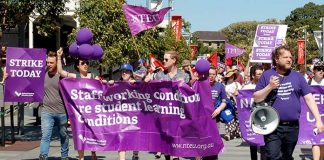In February, the National Union of Students released their new policy alternative to the Howard-era Voluntary Student Unionism (VSU) legislation. The policy calls for the introduction of a compulsory, deferred HECS-style “student support and services levy”.
The levy will be capped by the government and subject to approval by university administrations, and would pay for “essential student services” such as representation, advocacy, welfare services and clubs and societies only.
This policy is a retreat from a platform of independent, compulsory-membership student unions, and the culmination of the politically-light and lobbying-heavy anti-VSU campaign run by NUS since the threat of VSU first emerged nationally in 2005. It asks for 70 per cent less funding than student organisations had pre-VSU, in a capitulation to the idea that many campus facilities and services can be run as self-sufficient businesses.
More control of student unions would be handed to conservative university administrations, many of whom have refused to give practical support to student unions post-VSU, and have been at the forefront of driving neo-liberal reforms on campus.
The deferred levy option contains no provision to guarantee the independence of student activity from governments and university administrations. This is a necessity to preserve student unions as vehicles to fightback against the privatisation and rationalisation of education. While there is mention of the “concern” to maintain such independence, there is no mechanism in the policy to ensure this.
While NUS is staging two national days of action this year around education issues,around education issues, with ‘Scrap VSU’ as one of the key demands, this specific VSU policy is the continuation of a “behind closed doors” negotiation strategy rather than part of a broader, student-based campaign that works at gaining support on campus for student unions – the kind of support which would bring essential weight to any policy-negotiation table. If we want to see strong, fighting student unions that can really stand up for our rights, we need to be working at reinvigorating activism on campus, through building political collectives and campaigns which stand up for our right to an equitable education system, and putting pressure on NUS to do the same.
Amy Thomas





